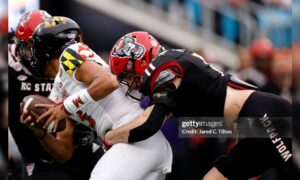While it should rightfully be regarded as very unlikely to happen, the subject of the Pittsburgh Steelers trading wide receiver Diontae Johnson this offseason has seemed to come up numerous times since their season ended.
The impetus behind it stems from fan discontent over his performance, but I suspect even the majority of those calling for his trade recognize it’s unlikely to happen. And I’ll explain why, getting the most obvious reason out of the way first.
Pittsburgh would only have George Pickens and a bunch of nobodies if they traded Johnson. Part of the reason that they were willing to trade Chase Claypool last year, aside from the excellent compensation, is the fact that they had Pickens and Johnson remaining.
Once they moved Claypool, they surely realized that they would have to address the wide receiver position this offseason. Trading Johnson would only exacerbate that and leave them with little else—or were you excited by Steven Sims’ performance? Calvin Austin III might play well in 2023, but any front office who counted on that happening is foolish.
More to the point, however, the deal Johnson signed with the Steelers last year was more than a one-year commitment. I don’t mean that literally, since the literal fact of the matter is self-evident. What I mean is that the deal Pittsburgh offered him is not one that they would have given him if they considered it remotely possible he would not be back.
Having remained largely behind the times in terms of contract structuring when it comes to signing bonuses and second- and third-year guarantees, Johnson’s two-year extension signed last year was robust in upfront money.
Originally due to earn only $2,790,000 for the 2022 season, Johnson instead pocketed $19 million, having his base salary reduced to $1.5 million and receiving a $17.5 million signing bonus. The total new-money value of the two-year extension was $36,710,000, meaning that they paid him 44.2 percent of the value of his two-year extension in the final year of his rookie contract.
That included a $16,210,000 pay raise since he was already under contract for the aforementioned value. If they really weren’t committed to making this a multi-year arrangement, it’s inconceivable that they would have given Johnson this sort of deal with this kind of structure. Only a little more than 55 percent of his actual new money is coming in the new portion of his contract.
Let’s make this clear. This is not an argument from the sunken cost fallacy, the idea that because the Steelers invested in Johnson what they already have, they would not trade him even if the circumstances changed.
What I’m saying is that the nature of the way the Steelers agreed to pay Johnson last year had built into it a philosophical commitment beyond one year. Whatever was to happen during the 2022 season, barring extreme circumstances, wasn’t going to suddenly make the organization completely change their opinion on him. They simply don’t structure contracts this way for players who aren’t building blocks like Joe Haden and T.J. Watt and Minkah Fitzpatrick.
Now, that’s not to say that if another stupid organization like the Las Vegas Raiders or the Chicago Bears were to offer the Steelers disproportionately good value in a trade offer they wouldn’t consider it. After all, as I said, this isn’t about the sunken cost fallacy. But does anybody really see anybody offering the moon for a guy like Johnson who’s been in the league for four years already?
One other reason that should make it clear they’re not going to move Johnson: as president Art Rooney II made clear yesterday, their objective this offseason is to create stability around young quarterback Kenny Pickett. Part of that was retaining Matt Canada as offensive coordinator. They’re not going to want to wipe out his wide receiver room and start fresh, either. It’s one of the reasons they gave Johnson the extension they did in the first place, to make sure that they have a core around Pickett in the early part of his career.
Oh, and one other wrinkle. He has a $2.5 million roster bonus due shortly after the start of the new league year on March 20. While it’s not an exorbitant figure, if they were going to trade him, it would be well before the draft unless they were to get him to agree to push the date back. And he would have no reason to do that. The Steelers have no leverage because there’s no threat of them cutting him, so he doesn’t have to be amenable to helping them trade him. In other words, they’re not going to know how the draft plays out at the position before they would likely want to get a theoretical trade done.








